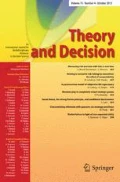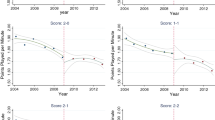Abstract
We study a best-of-two contest with two homogeneous players (teams). The winner is the player who wins in both stages. In the case of one victory for each team, a draw determines the identity of the winner. Each team has a value of winning the contest as well as a value of winning a single game. A team’s value of winning a game at its home field is higher than its value of winning a game away from home. We show that if winning in the first stage provides a psychological advantage in the second stage, each team would prefer to play the second stage at its home field.
Similar content being viewed by others
References
Amaldoss W., Rapoport A. (2009) Excessive expenditure in two-stage contests: Theory and experimental evidence. In: Haugen I. N., Nilsen A. S. (Eds.) Game theory: Strategies, equilibria, and theorems. Nova Science Publishers, Inc, Hauppauge, pp 241–266
Apesteguia J., Palacios-Huerta I. (2010) Psychological pressure in competitive environments: Evidence from a randomized natural experiment. American Economic Review 100: 2548–2564
Baye M., Kovenock D., de Vries C. (1996) The all-pay auction with complete information. Economic Theory 8: 291–305
Breitmoser Y., Tan J. H. W., Zizzo D. J. (2010) Understanding perpetual R&D races. Economic Theory 44(3): 445–467
Coffey B., Maloney M. T. (2010) The thrill of victory: Measuring the incentive to win. Journal of Labor Economics 28(1): 87–112
Courneya K. S., Carron A. V. (1992) The home advantage in sport competitions: A literature review. Journal of Sport and Exercise Psychology 14: 13–27
Deck C., Sheremeta R. M. (2011) Fight or flight? Defending against sequential attacks in the game of Siege. Journal of Conflict Resolution 54: 771–798
DellaVigna S. (2009) Psychology and economics: Evidence from the field. Journal of Economic Literature 47(2): 315–372
Gonzalez-Diaz J., Palacios-Huerta I. (2010) Pawns of the emotions: Psychological elements in cognitively sophisticated humans. mimeo, New York
Harris C., Vickers J. (1985) Perfect equilibrium in a model of a race. Review of Economic Studies 52(2): 193–209
Hillman A., Riley J. (1989) Politically contestable rents and transfers. Economics and Politics 1: 17–39
Klumpp T., Polborn M. (2006) Primaries and the new hampshire effect. Journal of Public Economics 90: 1073–1114
Konrad K., Kovenock D. (2009) Multi-battle contests. Games and Economic Behavior 66: 256–274
Magnus J. R., Klaassen F. J. G. M. (1999) On the advantage of serving first in a tennis set: Four years at Wimbledon. The Statistician (Journal of the Royal Statistical Society, Series D) 48: 247–256
Mago, S. D., Sheremeta, R. M., & Yates, A. (2011). Best of three contests: Experimental evidence. Working Paper, Chapman University, Orange.
Nevill A. M., Holder R. L. (1999) Home advantage in sport: An overview of studies on the advantage of playing at home. Sports Medicine 28: 221–236
Page L., Page K. (2007) The second leg home advantage: Evidence from European football cup competitions. Journal of Sports Sciences 25(14): 1547–1556
Price C. R., Sheremeta R. M. (2011) Endowment effects in contests. Economics Letters 111: 217–219
Sela A. (2011) Best-of-three all-pay auctions. Economic Letters 112: 67–70
Sheremeta R. M. (2010) Experimental comparison of multi-stage and one-stage contests. Games end Economic Behavior 68(2): 731–747
Terry P. C., Walrond N., Carron A. V. (1998) The influence of game location on athletes’ psychological states. Journal of Science and Medicine in Sport 1: 29–37
Zizzo D. J. (2002) Racing with uncertainty: A patent race experiment. International Journal of Industrial Organization 20: 877–902
Author information
Authors and Affiliations
Corresponding author
Rights and permissions
About this article
Cite this article
Krumer, A. Best-of-two contests with psychological effects. Theory Decis 75, 85–100 (2013). https://doi.org/10.1007/s11238-012-9313-8
Published:
Issue Date:
DOI: https://doi.org/10.1007/s11238-012-9313-8



